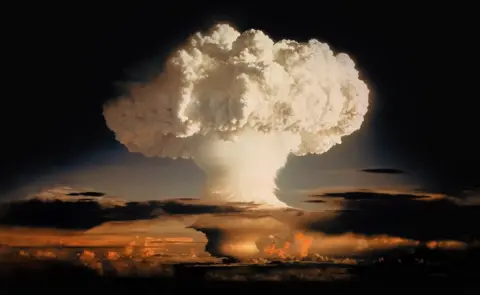A proposal to codify a new geological epoch based on humanity's influence on Earth has been rejected.
It means "the Anthropocene" will not be added to the chronostratigraphic chart featured in textbooks and on classroom posters to record the major changes in Earth history.
The International Union of Geological Sciences upheld an earlier vote by a lower committee to dismiss the idea.
But it also recognised the term Anthropocene had common currency.
"Despite its rejection as a formal unit of the geologic timescale, the Anthropocene will nevertheless continue to be used not only by Earth and environmental scientists but also by social scientists, politicians and economists as well as by the public at large," the IUGS said.
"It will remain an invaluable descriptor of human impact on the Earth system."
 USDE
USDEThe word Anthropocene comes from the Greek for human, "anthropo".
And the Anthropocene Working Group of scientists had spent over a decade studying the concept and definition of a new unit of geological time, using this label.
They had proposed its start date be 1952, the year nuclear-bomb test residues become evident in sediments worldwide.
The 1950s also mark the onset of the "Great Acceleration", when the human population and its consumption patterns suddenly speeded up.
Voted down
It coincides with the spread of ubiquitous "techno materials", such as aluminium, concrete and plastic.
And the group had even identified a location where this transition was exquisitely recorded - in the chemistry and particles that make up the muds of a lake near Toronto, Canada.
But the proposal was voted down earlier this month by the Subcommission on Quaternary Stratigraphy.
And that decision has now been accepted by the IUGS, despite objections.
 CONSERVATION HALTON
CONSERVATION HALTONWhile there is broad agreement humanity's impacts on Earth are pervasive and sufficiently distinctive to justify a separate geological classification, there is considerable debate over when our species became a force of global change.
For example, there is a strong body of opinion that any Anthropocene classification should reflect the major impacts humans introduced as they cut down forests and turned land over to agriculture, which would put the start date many thousands of years in the past.
Another attempt to introduce a new unit of geological time could now have to wait a decade.
In the meantime, we remain in the Holocene epoch, which started at the end of the last ice age, some 11,700 years ago.


Post a Comment